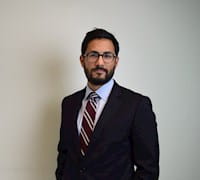Why was Booth the right place for you?
The flexibility and way Booth's program works is really helpful for someone coming from a nonprofit background. It helped strengthen the way I think about a nonprofit model, and having my peers who are thinking differently push or evolve the way I was thinking was also critical.It has helped the way that I look at not just what’s happening within the walls of my institution, but also the way I think about the larger macro issues that are happening in community spaces, whether in Chicago or beyond. It’s pretty amazing to be at Booth at a time when we’re forced to question how companies think about their business and look at the data to inform why certain decisions are made or why certain structures exist. Those fundamentals help me understand the way the world is changing right now.
How do you spend your time out of the classroom?
While so much of what’s important at Booth is in the classroom, I figured out early on that I would be missing out on a lot if I wasn’t an active participant in clubs. I’m a co-chair of Coalition of Minorities in Business. In my current job, I think a lot about equity, because we do a lot of equity planning. It has always been important for me to find spaces for and to hear diverse voices. It’s been really great to get to know other club members via Zoom calls and the Slack channels, because it's really interesting to hear their personal experiences of how they got there. Everyone's story is a little bit different, but there are always some similarities for those of us coming from underrepresented backgrounds and entering a place like Booth or the University of Chicago, that historically didn't always have a lot of people that look like us. It's interesting to hear their journeys and how they were or were not supported. As a leader I think through ways to find those blind spots in my institution’s work and to contribute to having more diverse teams and having more diverse environments.
To be a part of a small group of people that in some way, shape or form are actively changing the paradigms and are working to change the way business gets done, is a great reminder of how I can leverage the skills I learned at Booth and how much more work there is to be done. That's really exciting, because I feel like coming out of Booth, I can be someone that drives some of that.
Tell us more about your family
My dad was born in Mexico and moved to Texas when he was eleven. My mom grew up on the South Side of Chicago. Her grandparents come from Irish backgrounds, so in a lot of ways, the immigrant experience has always been a part of how I think about the world. As they say, ‘immigrants, we get the job done’. I have seen how hard my parents work in their careers and in their lives, and just how much they have chosen to give back, whether it's to their families or to the community, in terms of time or finance. Through my dad’s story I have seen what true sacrifice looks like to support a member of your family or your community. He’s a really great reminder of what's possible. My dad faced language challenges early on, having to change schools and go from an exclusively Spanish language school to an exclusively English language school. He made that transition so quickly, but a lot of that was because people put in the time to help him close that gap. I think with a little extra effort, we can close those gaps, and create better outcomes for people. My family is a good reminder that sometimes you just need to lend a hand to help people realize their full potential.
We cannot forget where we came from. We need to look behind us and realize that life sometimes requires picking someone up or just reaching out a hand and helping them through a situation whether it's small or big. Booth has challenged me to think bigger and about how you scale up. How does that look? How do you sustain the programs and systems to continue to do that on a larger scale? So that it's not just one person doing it for one person but it can be many doing it for many.
Learn about more ways to engage with the Latinx community



